beach cleanup
Stewards clean up the trashy beach and keep wildlife safe
Jun/25/17 04:06 PM
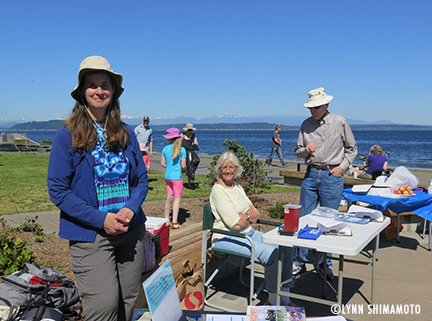
Seal Sitters annual “Sentinels of the Sound” Beach Cleanup was co-sponsored this year with sister network Sno-King Marine Mammal Response. Shown in photo is Sno-King’s Rachel Mayer, Seal Sitters’ Eilene Hutchinson and Larry Carpenter. Rachel and SSMMSN co-investigator Lynn Shimamoto talked to the crowd about types and dangers of debris and beach etiquette for walking among invertebrate beach inhabitants. Among the many enthusiastic participants were Seattle Girl Scout Troup #41404 and Brownies (2nd and 3rd graders), who recently voted to donate a portion of their cookie sales to Seal Sitters - humongous flipper hugs to the thoughtful girls.
For Seal Sitters, derelict fishing gear is an up close and personal issue. Once again, the cleanup was in honor of newborn seal pup Sandy, who was rescued by Seal Sitters in August of 2011 and rehabilitated at PAWS Wildlife Center. After months of rehab, she was finally released back to the wild, but found dead 66 days later, entangled in derelict fishing line off the Edmonds pier.
The event was also in honor of the juvenile gray whale that died on Arroyos beach in April of 2010. The necropsy revealed only human trash in the whale’s stomach.
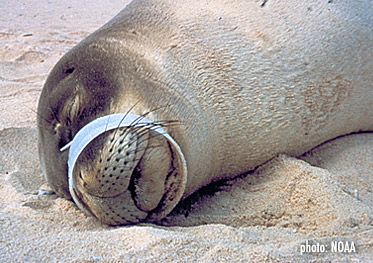
Learn more in-depth about the dangers of marine debris by visiting Seal Sitters’ website.
Thanks to everyone who gave wildlife a helping hand on Saturday!
Every day is Earth Day - beach cleanup a success
Jun/04/16 07:41 PM
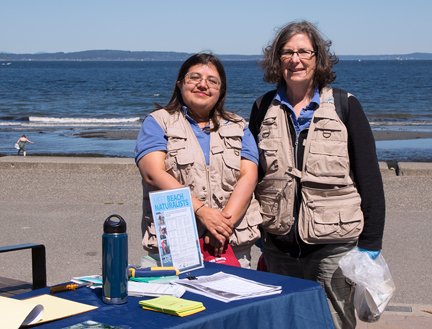
Before volunteers dispersed for “Sentinels of the Sound” trash duty, Seal Sitters’ Robin Lindsey spoke briefly about the devastating effects debris and plastic pollution have on marine life. The crowd was then treated to some rules of beach etiquette and info about invertebrates from Seattle Aquarium Beach Naturalist Janice Mathisen (on the right with colleague Zoey Black).
Enthusiastically grabbing buckets, bags and “pluckers”, volunteers set out on their mission to pick up toxic trash. Kids and adults could be seen scouring the area over the next two hours, returning with piles of glass and plastic bottles, cans, clothing and plastic caps. A recent study showed that a shocking 90% of all birds have plastic in their stomachs. Volunteers also brought back bags loaded with deadly cigarette butts. Cigarette filters take 5 years to biodegrade; within an hour of coming into contact with water, they begin leaching toxins into soil and waterways, poisoning the food chain.
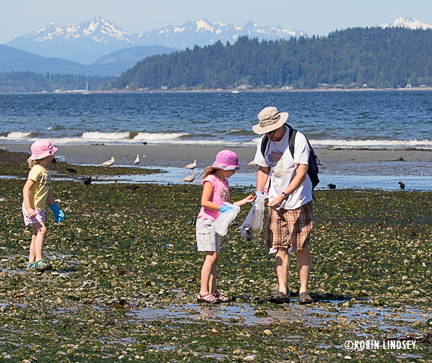
Along with the more obvious litter, brand new Seal Sitters volunteers Derek and daughters Laura and June (photo left) picked up minute pieces of plastic that animals mistake for food.
When you visit the beach, remember to stash some gloves and a garbage bag in your backpack. Every single piece of trash removed from our environment can truly have a positive impact and save wildlife from poisoning, injury and death. Every day is Earth Day.
"Sentinels of the Sound" beach cleanup to help marine life
May/21/16 06:44 PM
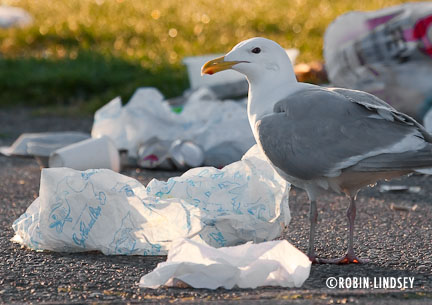
Before volunteers disperse to clean up the beach, there will be a brief talk on the devastating impact of trash and debris on marine life.
Did you know that an estimated 80% of marine debris originates from land? Or that 360 billion cigarette butts are discarded in the U.S. alone each year - all of them leaching toxic chemicals into the soil and waterways? At last year’s beach cleanup, volunteers picked up an estimated 9,000 butts from Alki Beach (and adjoining sidewalks and street) in just a few hours.
Did you know that derelict fishing gear and plastics injure and kill many thousands of marine mammals and seabirds annually? All of which can be prevented by careful - and proper - disposal.
For Seal Sitters, derelict fishing gear is a very up close and personal issue. Please visit our website to find out why and for more details about the cleanup. Bags will be provided, but please bring your own gloves and pickup sticks. RSVP is requested.
Learn more about our dangerous waters on Seal Sitters’ website.
Volunteers kick trash's butt - beach cleanup a resounding success
Jun/14/15 08:21 AM
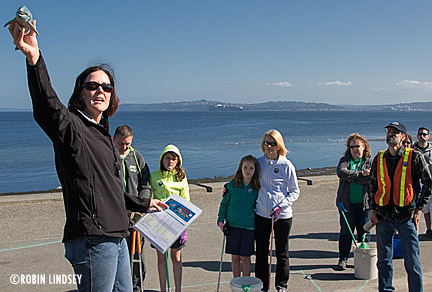
After a short welcoming from Seal Sitters, a heartfelt thank you was extended to PAWS Wildlife volunteers and staff who were in attendance. PAWS is a valued partner of the Marine Mammal Stranding Network as a rehab resource for harbor seal pups. Among the many West Seattle seal pups rehabilitated by PAWS was emaciated Sandy - only to die entangled in derelict fishing line after being returned to health and to the wild. Seal Sitters holds these annual cleanups in honor of Sandy and the Arroyos gray whale.
Peggy Foreman (shown above), education specialist for NOAA Fisheries, spoke about the impact of human trash on gray whales. Grays forage by scooping up large mouthfuls of sediment and water from the sea bottom and sieve small prey and crustaceans (such as tiny ghost shrimp) through their baleen. Sadly, when the ocean floor is littered with human trash, that is sucked in as well. Peggy spoke about the young gray whale who died on the beach in the Arroyos neighborhood in April of 2010. A necropsy of the thin juvenile showed virtually no food in the whale’s stomach, however, a disturbing amount of trash - plastic bags, funnel, golf ball, rope, half a pair of adult sweatpants. Peggy spread out a tarp with a representation of the trash found inside this whale; it provided a striking educational tool used to interact with the public.
Seattle Aquarium Beach Naturalist Daoud Miller pointed out the importance of making sure invertebrates were not using a piece of debris as a home before removing it from the beach. He also reminded participants that moon snail egg casings which look like trash are indeed NOT. Daoud was available throughout the morning, as was Amy Webster of PAWS, to answer questions from volunteers.
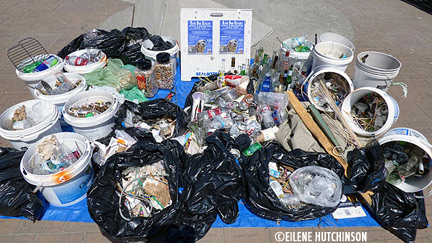
They returned lugging over 9,000 toxic butts and a sizable mass of trash (shown at right), all in less than two hours. People shouted out kudos from their cars as they drove by. Walkers strolling by the Statue Plaza were astonished at the pile that was accumulating and were so thankful for the volunteers’ great work. Some of them signed up on the spot to help out, too. It was amazing how much dangerous trash was collected in such a short time.
Seal Sitters thanks Amy, Daoud and Peggy for making our cleanup so informative. Huge thanks to all of the passionate people who made the beach a much safer home for marine life!
Yesterday afternoon, 42 people attended a Seal Sitters new volunteer training session. All in all, it was a very successful Saturday for wildlife and advocates.
Help wildlife - beach cleanup scheduled for June 13th
Jun/02/15 06:33 AM
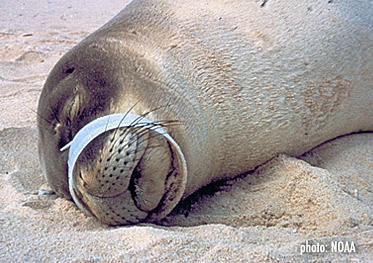
Did you know that an estimated 80% of marine debris originates from land? Or that 360 billion cigarette butts are discarded in the U.S. alone each year - all of them leaching toxic chemicals into the soil and waterways? Did you know that derelict fishing gear and plastics injure and kill many thousands of marine mammals and seabirds annually?
For Seal Sitters, derelict fishing gear is an up close and personal issue. To find out why and for more details about the cleanup, please visit our website. To ensure we have enough materials on hand for volunteers, an RSVP is requested. Seal Sitters is co-sponsoring this event with partners Seattle Parks, PAWS Wildlife Center and the Alki Community Council.
Volunteers gather mounds of trash from seemingly "clean" Alki
Jun/16/14 07:58 AM
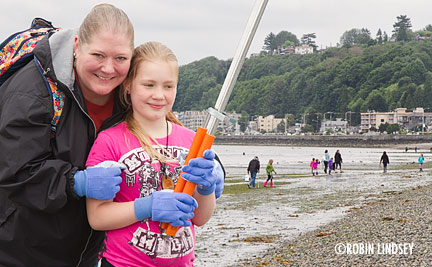
SS Lead Investigator Robin Lindsey and Amy Webster, PAWS Community Education Coordinator, gave a brief talk about the dangers of marine debris to wildlife. Since Friday was a dreary, rainy day with few beach-goers and Parks had done its usual early morning trash pickup, Alki Beach looked deceivingly void of trash. However, 73 volunteers (60 adults and 13 kids) fanned out over a wide area stretching from Constellation Park to Duwamish Head and sidewalks above, armed with gloves and long tweezers to pluck trash (photo shows PAWS Wildlife Rehabilitation Manager Emily Meredith with her daughter, as participants scour the beach in the background).
As volunteers returned to drop off their bags and buckets of trash, the pile grew by leaps and bounds - testimony that what appears to be a small amount of litter, indeed is very substantial. Among the inventory of intact and broken bottles, beer and soft drink cans, more than a thousand cigarette butts (which leech harmful chemicals into the water), plastic bottles, caps and lids was a dope pipe, a very disturbing 6 hypodermic needles (found in differing locations), a sizable blanket (large enough to potentially kill a gray whale if swallowed), auto tire, part of a boat, chains, piece
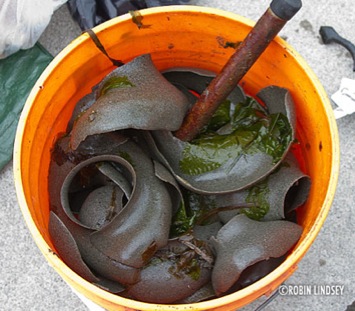
A number of volunteers also enthusiastically brought us what they thought to be plastic or rubber trash, but which were moon snail collars (photo right) - thin, circular casings of sand and mucous, each of which contains about 300,000 eggs. The collars were promptly returned to the beach. For information about moon snail collars, read Seal Sitters’ education advisor Buzz Shaw’s marine life blogpost.
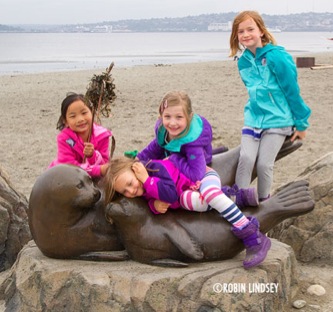
Seal Sitters thanks Seattle Parks for providing materials for the cleanup and our co-sponsor/partners PAWS Wildlife Center and Alki Community Council. We hope everyone will continue to pick up trash during their trips to the beaches - every day is beach cleanup day.
"Sentinels of the Sound" beach cleanup June 14th
Jun/10/14 07:01 AM
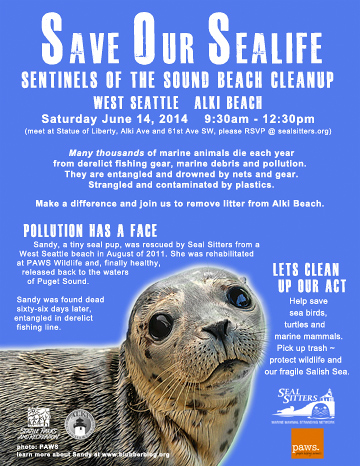
Please RSVP.
Prior to dispersing volunteers with materials to pick up trash, Seal Sitters and PAWS Wildlife Center will speak briefly at 9:30 about the dangers of marine debris to wildlife and the difficult rehab of harbor seal pups.
All marine life is endangered by marine debris and pollution. Many, many thousands of marine animals and sea birds die each year from derelict fishing gear, marine debris and pollution. They are entangled and drowned by nets and gear. Strangled and contaminated by plastics. Sea birds choke on plastic and limbs are severed.
This year's beach cleanup events will once again be in honor of seal pup Sandy who was rescued from a West Seattle beach in August of 2011, rehabilitated at PAWS Wildlife Center, and then released back to the wild in January of 2012. Sandy was found dead 66 days later, entangled in derelict fishing gear. The event is also in honor of the juvenile gray whale that died on Arroyos beach in April of 2010. The necropsy revealed only human trash in the whale’s stomach.
Please join us to help save marine life! For more info and to RSVP, please click here.
No "butts" about it - Alki Beach cleanup a success
Aug/03/13 09:04 PM
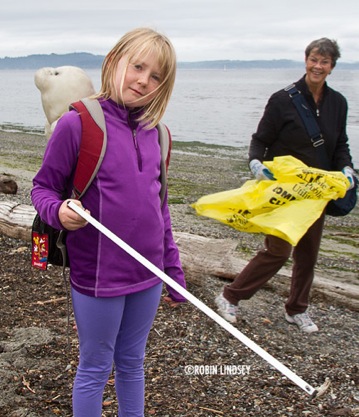
Because yesterday was such a dreary, rainy day with not too many beach-goers, there was not the typical overflow of Friday night garbage strewn all over the sidewalks and beach. However, we assured everyone they would find lots of small, harmful trash - including many cigarette butts. In fact, well over an estimated thousand cigarette butts were picked up in a matter of hours along with plastics and paper.
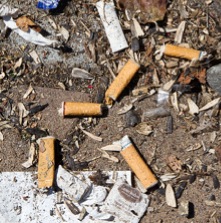
The beach cleanup was a great success - all in all, over 100 hours of volunteer time were donated this morning (we’re still tallying the hours) to help keep all of us and the wildlife we love safe. We thank everyone for their hard work and passion! And a special thanks to SS hotline guru Larry Carpenter for puling everything together to make this happen.
"Sentinels of the Sound" beach cleanup in honor of seal pup Sandy
Jul/17/13 07:07 PM
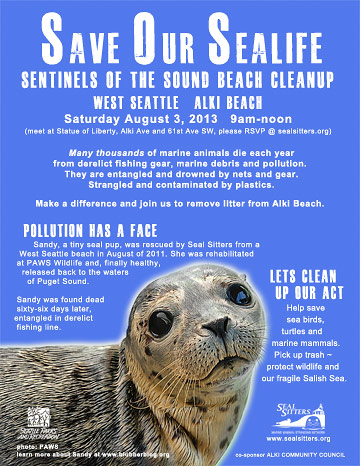
Harbor seals (who do not migrate and are year-round residents) and orcas, both animals at the top of the food chain, are especially hard hit by pollutants from storm runoff and microplastics which are stored in their blubber. A 2005 study showed that harbor seals of South Puget Sound were 7 times more contaminated with PCBs than those of Canada's Georgia Strait. The orcas of Puget Sound are the most contaminated marine mammals in the world.
All marine life is endangered by marine debris and pollution. Many, many thousands of marine animals and sea birds die each year from derelict fishing gear, marine debris and pollution. They are entangled and drowned by nets and gear. Strangled and contaminated by plastics.
This year's beach cleanup events will once again be in honor of seal pup Sandy who was rescued from a West Seattle beach in August of 2011, rehabilitated at PAWS Wildlife Center, and then released back to the wild in January of 2012. Sandy was fitted with a satellite tag (glued to her fur which would be shed when she molted) to monitor her success in the wild and provide valuable data to biologists about foraging patterns of rehabbed seals. Sixty-six days later, Sandy was found dead, entangled in derlict fishing line off the Edmonds Pier. Read more about Sandy.
Sandy has truly put a face on pollution. Trash on the beach becomes treacherous in the water. You can make a difference! Help keep our beaches clean and our sea life safe. Read more about marine pollution here.
We would also like to honor the memory of the Arroyos gray whale who stranded and died in 2010. The necropsy revealed that there was no food in the thin juvenile male's stomach - only human trash.
Seal Sitters, along with co-sponsors Alki Community Council and Seattle Department of Parks and Recreation, will hold a cleanup of West Seattle's Alki Beach on Saturday, August 3 from 9am-noon. We will assemble at Alki's Statue of Liberty plaza (61st Ave SW and Alki Ave SW). Please RSVP for this event so we have enough bags and equipment on hand.
Read about last year's event here.
Beach cleanup a big success as volunteers honor seal pup Sandy
Jul/22/12 11:19 AM
While the beach did not appear to be as littered as usual on a summer Saturday morning due to a rather rainy Friday, the volunteers filled about 10 large trash bags. They picked up many cans, plastic bottles and caps, countless cigarette butts, and among other things a kayak paddle, a woman's black and pink bra and dirty diapers. Students from UW's Environmental Studies program each donated over 3 hours of their time, picking up bags of trash including spent fireworks on Constellation Beach - fireworks that leave toxic residue and contaminate the Sound. We even had a family drive all the way from Ellensburg, well over 100 miles each way, just to pick up trash on the beach! Brooklyn, the "almost" 9 year old daughter, read about seals on our website, saw the post about Sandy and told her mom and dad (super-parents Vanessa and Kevin) that she wanted to come help seal pups by cleaning up the beach. We can't thank everyone enough for helping out. A total of 128.5 hours were donated yesterday morning. All of these volunteers are a true inspiration and made a difference for our sea life. Special kudos to SS vols David and Eilene Hutchinson and Larry Carpenter.
Find out more about the dangers of marine pollution on Seal Sitters’ website.
Alki Beach cleanup in honor of seal pup Sandy
Jul/09/12 05:44 AM
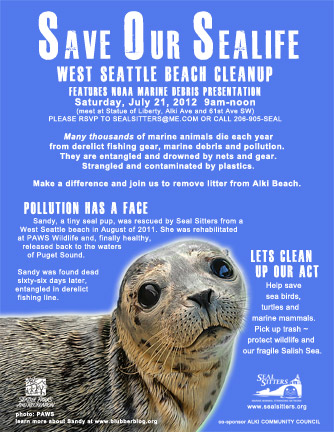
Sandy the seal pup truly puts a face on the dangers of marine pollution and trash. You may also remember the young gray whale that stranded and died on Arroyos Beach - the only contents in his stomach were human trash. Please make a difference and join us. Countless thousands of marine animals die as a result of marine debris, trash and pollution. Trash that is on the beach becomes treacherous in the sea. Read more about marine pollution on Seal Sitters’ website.
Peggy Foreman of NOAA will discuss the dangers of marine debris and pollution shortly after we assemble at 9am. We will meet at the Statue of Liberty (next to the Alki Bathhouse on Alki Beach 61st Ave SW and Alki Avenue SW). Please rsvp for this event as Parks will be providing trash grabbers and buckets for participants.
To print out a copy of this flyer to post at your work or business, please click here. The flyer is a full bleed and may need to be set at “reduce to fit” for some inkjet printers.







